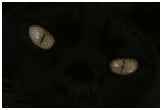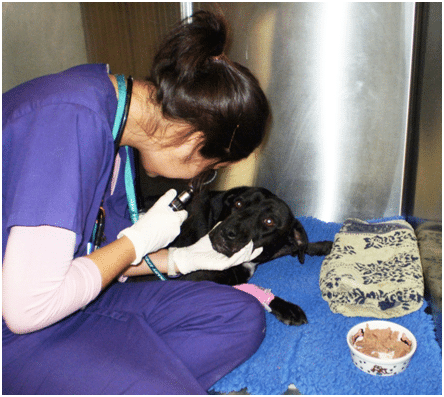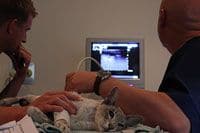Pets Eyes And Medical Emergencies
Eye injuries can deteriorate rapidly if not seen to by a veterinarian

Symptoms
- Bleeding into eye
- Irregular/abnormal pupil size or pupil unresponsive to light
- Sudden blindness (walking into objects, using the wall as a guide when walking)
- Yellow/grey discolouration within eye
- Cloudiness of eye
- Irregularity in surface of eye
- Discharge coming from eye
- Eye “popped out” of socket
- Pain:
- Third eyelid protruding (a pink membrane that originates at the corner of the eye)
- Squinting, or holding eye closed
- Appetite loss, inactivity
Emergency treatment before transport to a veterinarian
Keep away from bright light as this may cause increased pain.
Prevent pet from rubbing/scratching face.
If grass seed or penetrating foreign object visible, leave it in place and seek immediate vet attention.
If eyeball has “popped out” of socket keep moist with a clean moist cloth. Do not attempt to replace the eyeball, this may cause more damage.
Disease and injury of the eye can be an emergency, and you should seek veterinary advice or attention as soon as possible.
Eye conditions considered to be an emergency
 Uveitis
Uveitis
Is a very painful condition involving inflammation within the eyeball involving the iris. There are many causes, including cat fights, penetrating wounds, cataracts, viral infections, cancer and toxic causes. Uveitis can progress to glaucoma.
Glaucoma
This is increased pressure within the eye causing stretching of the eyeball and retinal and optic nerve damage. Glaucoma is extremely painful, and can cause irreversible blindness if not treated appropriately.
Proptosis
Eyeball popped out of the socket. This problem is more common in flat faced breeds such as Pug dogs and Persian cats and often occurs due to trauma from a motor vehicle accident or a dog fight. Treatment may involve emergency replacement and suturing of eyelids together. Prognosis for return of vision is poor especially in cats, and may require complete removal of the eye if the muscles surrounding the eye are ruptured. Nonetheless, there are veterinary ophthalmologists who can provide the best advice on how to save the eye and your pet’s vision.
Foreign Body
In Western Australia, these are commonly grass seeds and can be associated with corneal ulceration and pain. Foreign bodies can potentially rupture the eye and cause infection.
Corneal Ulceration
This is a common eye problem and can be very painful. The cornea is a very delicate structure and ulcers can easily develop on the surface of the eye. Severe cases are considered an emergency as they can deteriorate so rapidly that the eyeball can rupture.
Neurological problems involving the eye
Immediate veterinary attention is recommended when associated with other serious neurological signs such as seizures, nystagmus (flicking of the eyeball), unchanging or unresponsive pupil size, head tilt, etc.
What to expect at the vet
- Full physical and ophthalmological (eye) examination
- Blood tests if necessary
- Staining surface of eye to check for corneal ulceration
- Medications as necessary, both topical (applied to eye) or systemic (injection or oral medication)
- May require general anaesthesia for further examination or surgery e.g. to remove a foreign body
- Head bucket (Elizabethan collar) to prevent rubbing eye
With prompt and timely diagnosis and treatment, many eye conditions can be successfully treated, maintaining the visual function of the eye. In cases of emergency ocular disease, if treatment is delayed, this can result in irreversible blindness in the affected eye. If your pet is showing signs of ocular disease, we strongly recommend that you seek veterinary attention.




